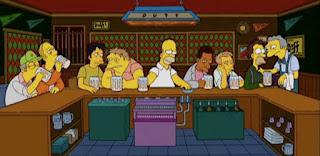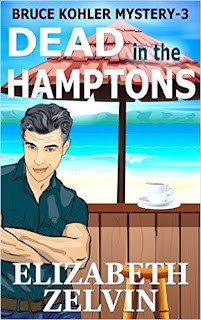I have been enjoying Andrew Welsh-Huggins' fiction for years. I recently heard him interviewed on the House of Mystery podcast and was intrigued by a phrase he used. I invited him to expand on it, and it is the title of this piece. Andrew has been nominated for the Shamus, Derringer and International Thriller Writers Awards. His eighth Andy Hayes novel, Sick to Death, came out this month. Read more about him here.
WWAD: What Would Andy Do?
by Andrew Welsh-Huggins
I just can’t get this guy out of my head.
The person in question is Andy Hayes, the fictional protagonist in my long-running series about a former Ohio State and Cleveland Browns quarterback turned private eye. He’s been knocking around my cranium for a dozen years or more, since the day I decided to take a break from writing nonfiction and try my hand at a private eye novel.
So that’s how it happened.
Zip it. I’m trying to explain some stuff here.
Ooh, Mr. Fancy Novelist.
Anyway, like many of my characters, he didn’t come close to arriving fully formed. When he first popped into my imagination, he was on a long bike ride someplace in Ohio and suddenly fielded a call from a potential client. He didn’t even have a football background yet. But not to worry. He settled in, made himself comfortable, and got down to the business of accompanying me everywhere I went as I got to know him. He still does, all these years later, whether I like it or not.
Are you saying I’m annoying?
Not really. But please, keep it down. I’m writing.
Again? What a surprise.
It’s true that anytime I encounter a boorish or mean person, I imagine how Andy would deal with them, up to and including a physical encounter. As someone who’s been in approximately one physical fight in my sixty-odd years, I take all the cues I can get for how to write realistic confrontations. More valuable to character-building, however, is putting myself in my protagonist’s shoes in a variety of quotidian activities, from jogging to shopping to eating out.
Which reminds me, I’m hungry.
Tell me something new, why don’t you?
In general, I look at the world through Andy’s eyes in three situations:
• Restaurants. I spend way too much time figuring out what kind of food my protagonist would order, but it’s all part of figuring out his personality. On the surface, Andy would appear to be a classic meat-and-potatoes guy, with pizza for dessert. But he, like any parent, is influenced by what his health-conscious kids order and increasingly isn’t averse to salads and vegetarian meals from time to time (not to mention his girlfriends’ preferences).
I draw the line at quinoa, though.
Sorry, bud. I’m the one who draws the lines.
• Sporting events. This is not as obvious a character-seeking exercise as you’d think, given Andy’s fictional backstory. As a young man, he went from BMOC star quarterback to throwing a game that cost Ohio State the national championship. Not surprisingly, a few decades on he has mixed feelings about sports culture and its associated fanatics. As a result, it’s illustrative to find him watching a baseball game, hockey match, or soccer contest, and see him wrestle with his feelings about his sporting past, especially when people around him are enjoying the game. I’ve learned a lot about the guy sitting in ballpark and arena seats.
You forgot Roller Derby.
Thanks, Mr. Equal Opportunity.
ª Finally, shopping. Forget gun battles, fist fights and, oh yeah, a moral compass. Figuring out how my protagonist would tackle a trip to the grocery store, Target, or Walgreens or CVS, is one of the best exercises in determining character I’ve found. Does he choose organic or non-organic produce? (Non-organic, like me.) Does he buy name-brand or generic toiletries and cleaning supplies? (Generic, unlike me). Whole milk or skim? Pulped juice or non-pulp? Folgers or Starbucks?
And kibble.
Right. Gotta keep your labrador happy.
Though trivial-sounding, these in-my-head conversations are crucial to determining character traits and quirks. But they are also important in reining in what I think of as authorial auto-reflection, or a tendency to assign a favorite character my own preferences, prejudices, and perspectives, without discerning whether he or she would actually think that way.
Over the years, this has helped me infuse my protagonist with significant differences: he stocks and drinks Carling Black Label beer, for instance, whereas I’m hard-pressed to have more than one or two cans of the swill a year.
Swill. Really?
Yes. Really.
Moving on. He’s a dog person, I’m a cat guy. He’s all about non-fiction, I’m mainly (though not exclusively) a fiction reader. Perhaps most importantly to the series, he’s been married twice, with a broken engagement thrown in for good measure, has two sons by two different ex-wives, and an adult daughter from a one-night stand he barely remembers. These days, trying to put his bad boy past behind him, he operates as a kind of serial monogamist. As for me, I’ve been married to the same woman for forty years. But my protagonist and I both have three children, so at least there’s something in common on the family front.
Ten years in, I still walk to the post office trying to figure out which side of the street Andy would choose and what he’d look at on the way. But the relationship is more comfortable, and more familiar, now than we’ve been together for so long.
Fortunately, I have another challenge. I’m writing about a new character these days, Mercury Carter, a former federal agent turned freelance courier, who is cut from a different cloth than my ex-quarterback. I know Mercury loves baseball, prefers tea to coffee, and eschews most alcohol with the weird exception of sake. Why any of this is so, I’m still trying to figure out. After all, he’s only just taken up residence. And there’s a lot to learn about him.
Hey. Who’s the new guy? It’s getting crowded in here.
Get used to it. There’s more on the way.
Oh, joy.


















